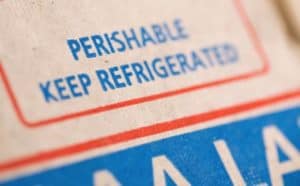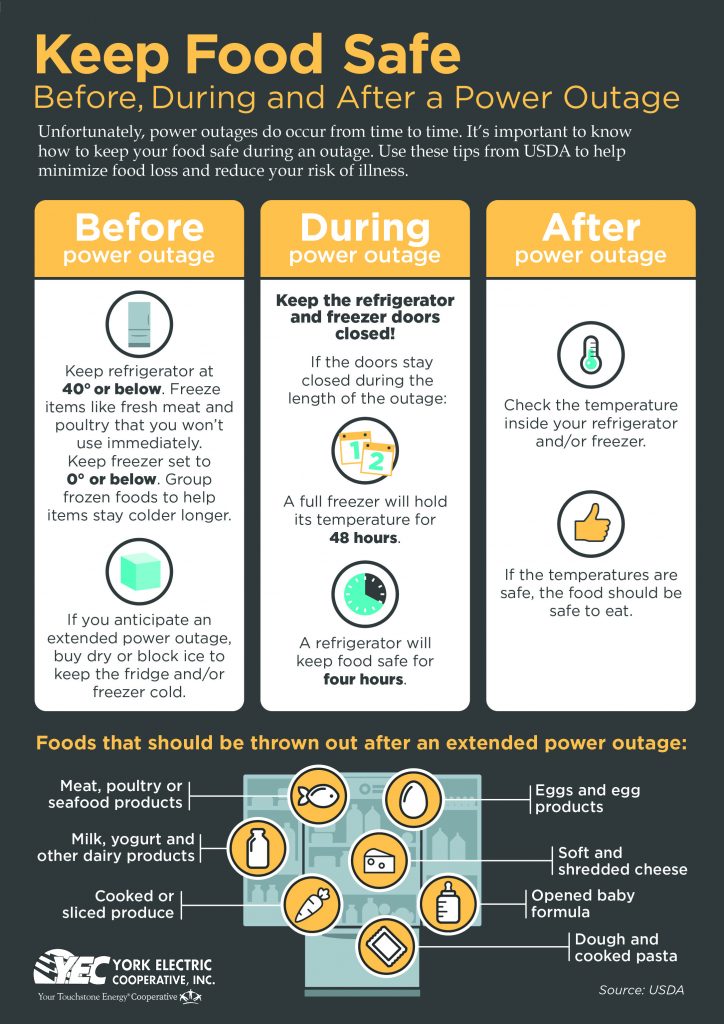 Keeping Food Safe During an Emergency
Keeping Food Safe During an Emergency
Did you know that a flood, fire, national disaster, or the loss of power from high winds, snow, or ice could jeopardize the safety of your food? Knowing how to determine if food is safe and how to keep food safe will help minimize the potential loss of food and reduce the risk of foodborne illness. This fact sheet will help you make the right decisions for keeping your family safe during an emergency.
ABCDs of Keeping Food Safe in an Emergency
Always keep meat, poultry, fish, and eggs refrigerated at or below 40 ºF and frozen food at or below 0 ºF. This may be difficult when the power is out. Keep the refrigerator and freezer doors closed as much as possible to maintain the cold temperature. The refrigerator will keep food safely cold for about 4 hours if it is unopened. A full freezer will hold the temperature for approximately 48 hours (24 hours if it is half full) if the door remains closed. Obtain dry or block ice to keep your refrigerator as cold as possible if the power is going to be out for a prolonged period of time. Fifty pounds of dry ice should hold an 18-cubic foot full freezer for 2 days. Plan ahead and know where dry ice and block ice can be purchased.
Be prepared for an emergency by having items on hand that don’t require refrigeration and can be eaten cold or heated on the outdoor grill. Shelf-stable food, boxed or canned milk, water, and canned goods should be part of a planned emergency food supply. Make sure you have ready-to-use baby formula for infants and pet food. Remember to use these items and replace them from time to time. Be sure to keep a hand-held can opener for an emergency.
Consider what you can do ahead of time to store your food safely in an emergency. If you live in a location that could be affected by a flood, plan your food storage on shelves that will be safely out of the way of contaminated water. Coolers are a great help for keeping food cold if the power will be out for more than 4 hours—have a couple on hand along with frozen gel packs. When your freezer is not full, keep items close together—this helps the food stay cold longer.
Digital, dial, or instant-read food thermometers and appliance thermometers will help you know if the food is at safe temperatures. Keep appliance thermometers in the refrigerator and freezer at all times. When the power is out, an appliance thermometer will always indicate the temperature in the refrigerator and freezer no matter how long the power has been out. The refrigerator temperature should be 40 ºF or below; the freezer, 0 ºF or lower. If you’re not sure a particular food is cold enough, take its temperature with a food thermometer.

More Tips to Keeping Food Safe in an Emergency
Emergency Food Safety FAQ
Drink only approved or chlorinated water. Consider all water from wells, cisterns, and other delivery systems in the disaster area unsafe until tested. Purchase bottled water, if necessary, until you are certain that your water supply is safe. Keep a 3-day supply of water or a minimum of 3 gallons of water per person.
Discard all food that came in contact with floodwaters, including canned goods. It is impossible to know if containers were damaged and the seal compromised. Discard wooden cutting boards, plastic utensils, baby bottle nipples, and pacifiers. There is no way to safely clean them if they have come in contact with contaminated floodwaters. Thoroughly wash metal pans, ceramic dishes, and utensils with hot soapy water and sanitize by boiling them in clean water or by immersing them for 15 minutes in a solution of 1 teaspoon of chlorine bleach per quart of water.
Discard food that has been near a fire. Food exposed to fire can be damaged by the heat of the fire, smoke fumes, and chemicals used to fight the fire.
Food in cans or jars may appear to be okay, but the heat from a fire can activate food spoilage bacteria. If the heat is extreme, the cans or jars themselves can split or rupture, rendering the food unsafe.
One of the most dangerous elements of a fire is sometimes not the fire itself, but toxic fumes released from burning materials. Discard any raw food or food in permeable packaging — cardboard, plastic wrap, screw-topped jars, bottles, etc. — stored outside the refrigerator. Food stored in refrigerators or freezers can also become contaminated by fumes. The refrigerator seal isn’t airtight and fumes can get inside.
Chemicals used to fight the fire contain toxic materials and can contaminate food and cookware. Food that is exposed to chemicals should be thrown away; the chemicals cannot be washed off the food. This includes food stored at room temperature, such as fruits and vegetables, as well as food stored in permeable containers like cardboard and screw-topped jars and bottles. Cookware exposed to fire-fighting chemicals can be decontaminated by washing in soap and hot water. Then submerge for 15 minutes in a solution of 1 teaspoon chlorine bleach per quart of water.
No. Frozen food can thaw if it is exposed to the sun’s rays, even when the temperature is very cold. Refrigerated food may become too warm, and foodborne bacteria could grow. The outside temperature could vary hour by hour, and the temperature outside will not protect refrigerated and frozen food. Additionally, perishable items could be exposed to unsanitary conditions or to animals. Animals may harbor bacteria or disease; never consume food that has come in contact with an animal.
Rather than putting the food outside, consider taking advantage of the cold temperatures by making ice. Fill buckets, empty milk cartons or cans with water and leave them outside to freeze. Then put the homemade ice in your refrigerator, freezer, or coolers.
Never taste food to determine its safety! You will have to evaluate each item separately. If an appliance thermometer was kept in the freezer, read the temperature when the power comes back on. If the appliance thermometer stored in the freezer reads 40°F or below, the food is safe and may be refrozen. If a thermometer has not been kept in the freezer, check each package of food to determine the safety. Remember, you can’t rely on appearance or odor. If the food still contains ice crystals or is 40°F or below, it is safe to refreeze.
Refrigerated food should be safe as long as power is out no more than 4 hours. Keep the door closed as much as possible. Discard any perishable food (such as meat, poultry, fish, eggs, and leftovers) that have been above 40°F for 2 hours.
Yes, the food may be safely refrozen if the food still contains ice crystals or is at 40°F or below. You will have to evaluate each item separately. Be sure to discard any items in either the freezer or the refrigerator that have come into contact with raw meat juices. Partial thawing and refreezing may reduce the quality of some food, but the food will remain safe to eat.
For additional food safety information about meat, poultry, or egg products, call the toll-free USDA Meat and Poultry Hotline at 1-888-MPHotline (1-888-674-6854); for the hearing-impaired (TTY) 1-800-256-7072. The Hotline is staffed by food safety experts weekdays from 10 a.m. to 4 p.m. Eastern time. Food safety recordings can be heard 24 hours a day using a touch-tone phone.
Information is also available from the FSIS website: www.fsis.usda.gov